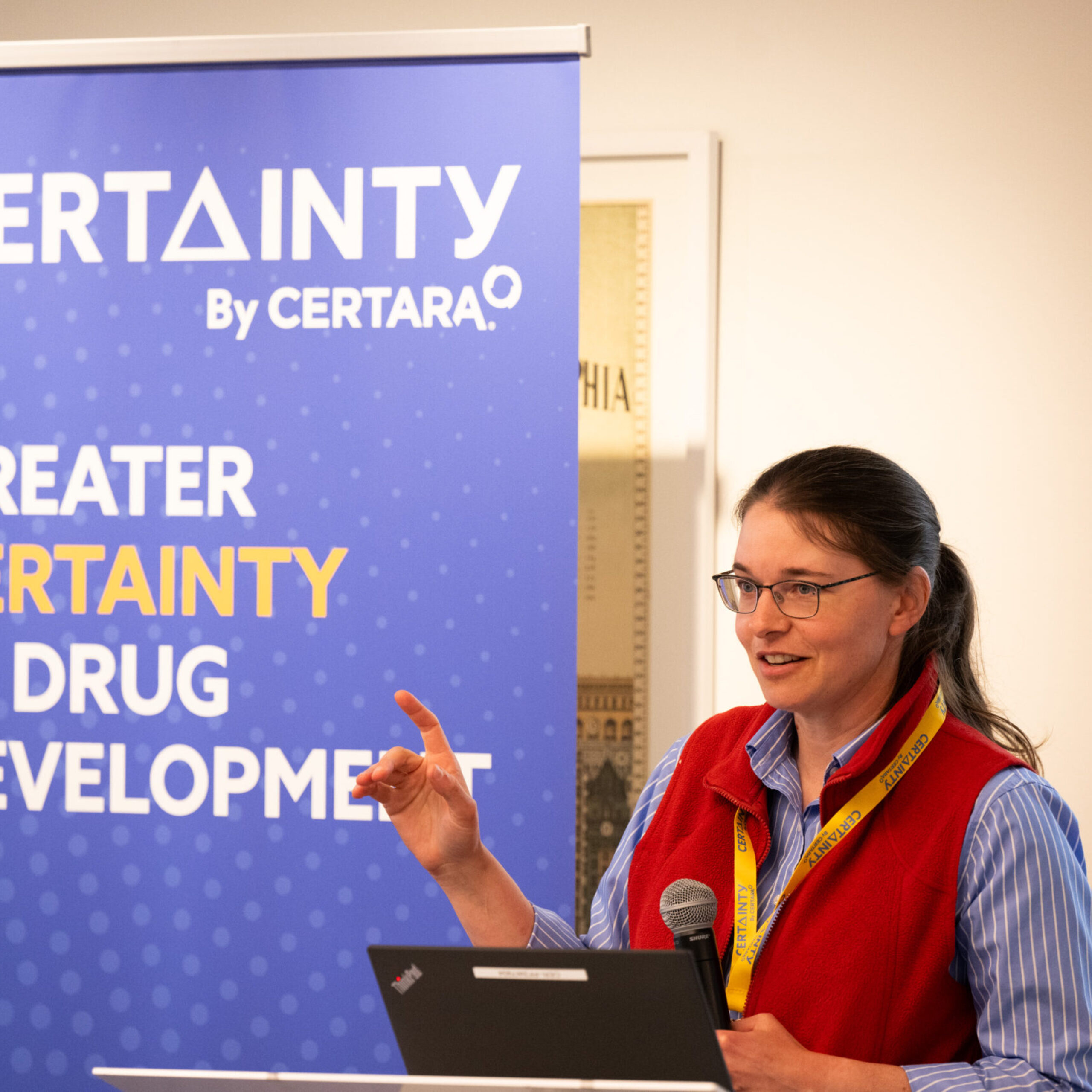our schedule
Breakfast & Badge Pick Up
Welcome to Certainty
Our Certainty theme in 2026 is “Right from the start”. Together, we’ll delve into how the how AI enabled modeling and simulation supported by digital data flows is improving decision making at every stage of R&D and bringing the best new medicines to patients.
The Innovation Circle: Driving Outcomes in R&D
Ideas, actions, and collaborations driving productivity, insight generation and a faster, more flexible and patient centric approach to medicine discovery and development. This session will share insights from leaders in drug discovery and development responsible for driving digital transformation and integration to driver, faster and more agile decision making.
Panel Moderator: Sheila Rocchio
Panelists:
Matt Rizk, PhD, Associate Vice President, Translational Sciences & Outsourcing
Department of Pharmacokinetics, Dynamics, Metabolism, and Bioanalytics, Merck
Right from the Start: AI Enabled Science and Scientists: Introducing Certara Nexus for faster, model-informed decision making that regulators Trust
This session will showcase how AI is changing drug discovery and development focusing on insights and speed that democratize modeling and simulation insights earlier to speed the most promising new medicines to patients. An early look at new capabilities coming soon to the Certara portfolio will be demonstrated in this session.
Speaker: Chris Bouton, PhD, Certara CTO
Morning Break - Demo Bar
User Group Meetings
P21 Live: Digital Data Flow Optimization
Discovery: Intelligent Lead Optimization with Chemaxon and D360
Modeling & Simulation from Strategy to Approval
Lunch & Demos
User Group Meetings
P21 Live: Digital Data Flow Optimization
Discovery: Intelligent Lead Optimization with Chemaxon and D360
Modeling & Simulation from Strategy to Approval
Afternoon Break
Keynote Presentation
Close of Day
Breakfast & Badge Pick Up
From Protocol to Submission: A Certara Workflow
Like a decathalon, a clinical study is a series of challenges. Selecting the right endpoints. Drafting a protocol. Setting up data collection. All this needs to happen before the first patient visit. From there, it’s wave after wave of data validation and analysis, reporting and table-creation, and the million-and-one checkpoints of submission.
How much time, cost, and pain might be saved by relying on a suite of interconnected solutions, each purpose-built for its task? Find out in this fast-paced demonstration of Certara capability from protocol to submission. In 30 minutes, you’ll see how our increasingly AI-driven technology supports your organization right from start, when a study is little more than a justified hope. Sean McGee will present solutions for endpoint selection, optimal trial design, data standardization, analysis, reporting, and more. Live 5-plus years of the trial life in a half-hour, all with Certara by your side.
User Group Meetings
P21 Live
Phoenix
QSP Summit
PBPK Modeling Workshop
Discovery
Morning break
User Group Meetings Continued
P21 Live
Phoenix
QSP Summit
PBPK Modeling Workshop
Discovery
Lunch
User Group Meetings Continued
P21 Live
Phoenix
QSP Summit
PBPK Modeling Workshop
Discovery
Close of day
Based on attendee feedback, Certainty 2026 will feature more in-depth UGMs and Workshops on Pinnacle 21, QSP, Phoenix, Discovery, PK/PD, and PBPK. Choose the interactive sessions that best suit your interests over the 2-days:
Phoenix User Meeting
Phoenix users can explore how empirical PK/PD methods work alongside in silico approaches by attending Modeling & Simulation from Strategy to Approval on Day 1 of Certainty. On Day 2, you’ll get an interactive look at new features, our roadmap, and AI’s expanding role in modeling and reporting.
QSP Summit
Attendees of the QSP Summit are also encouraged to attend Modeling & Simulation from Strategy to Approval on Day 1 of Certainty. On Day 2, we will explore how QSP is transforming MIDD through computational modeling, AI integration, and mechanistic insights. Sessions will feature case studies across disease areas, and forward-looking discussions on regulatory adoption and the future of predictive modeling.
Discovery: Intelligent Lead Optimization with Chemaxon and D360
With the explosion of new modalities, informatics is expanding its scope as AI closes gaps between chemistry, safety, and efficacy. Join this track to explore how predictive modeling is reshaping compound design and enabling a clearer view downstream in drug discovery.
PBPK Modeling Workshop
Attendees of PBPK Modeling Workshop are also encouraged to attend Modeling & Simulation from Strategy to Approval on Day 1 of Certainty. On Day 2, we’ll showcase how PBPK informs decisions for first-in-human dosing to formulation, drug–drug interactions, and special population optimization. Expert talks and case studies will offer practical insights to strengthen confidence in model-informed development.
Modeling and Simulation from Strategy to Approval
Learn how empirical PK/PD methods like NCA and popPK are complementing in silico approaches like PBPK and QSP to answer the most daunting challenges in development, from optimal first-in-human dosing to presenting clin pharm evidence effectively in your NDA or BLA. Attendees of the Phoenix User Meeting, QSP Summit, and PBPK Modeling Workshop are encouraged to attend this session on Day 1 of Certainty.














